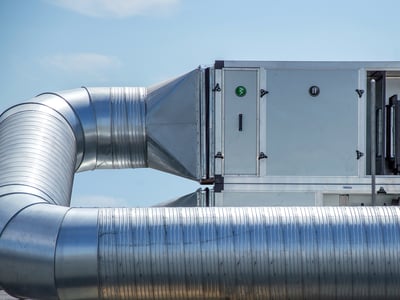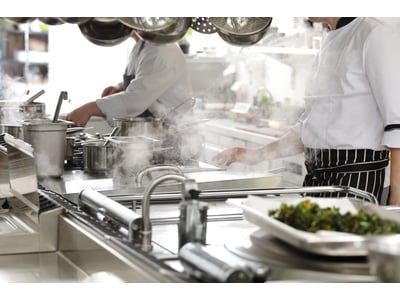Put clean indoor air on the menu at your restaurant – and minimise fire risk, eliminate odour nuisance and complaints, and increase customer loyalty by providing fresh, clean air.
Today, more and more people are going out to eat. They’re also rating their overall customer experience down to the most minute details. This increased traffic can bring in more profit, but also kitchen hazards. That’s why restaurants of all types need careful air management.
A busy commercial kitchen has quite different requirements than the “front of house” dining area, which requires a more comfortable, quiet ambience. In the kitchen, a high-rate restaurant ventilation system is used to remove heat from cooking processes and collect smoke, steam and oil mist.
This air is typically dumped into atmosphere. Moving such contaminated air through buildings and discharging to the atmosphere attracts various risks, including:
Commercial kitchens are highly ventilated to remove heat, smoke and steam. Careful treatment of the exhaust air and supply air is essential to minimise fire risk, eliminate odour nuisance and provide paying guests with good air quality.
To mitigate the risks, the best solution is an appropriate combination of air filtration that coalesces oil and grease, collects fine particles and finally removes the gases responsible for odour. Loadings of oil, grease, particulates and odour can be quite high in kitchen exhaust applications. After a successful installation, specified maintenance procedures must be followed to ensure ongoing effectiveness.
All the air that is removed from a kitchen and restaurant must be replenished. If not treated appropriately, this replacement outdoor air also brings associated risks to food hygiene, damage to finishes and furnishings, and of course the well-being of staff and diners. So, incoming air has got to be properly filtered to achieve high levels of indoor air quality (IAQ). For human protection, it is important that the smaller particle fraction, PM1, is effectively filtered with ePM1 filters according to ISO 16890.

Protect people, processes, products and equipment while keeping maintenance and energy costs low by keeping air handling units unclogged.

Commercial kitchens are highly ventilated to remove smoke, grease and stream. Exhaust filtration is used to minimise the risk of duct fires and remove odour nuisance.

Customers want to eat at restaurants that control food safety and dining area cleanliness. Eliminate food preparation odours and particulates, and decrease the possibility of airborne food contamination and fire hazards from airborne oil vapors.

CamCarb XG Engineered for energy and maintenance cost savings in molecular contamination control applications
Food and beverage Commercial and public buildings Electronics and optics
Camfil launched the Hi-Flo bag filter range in 1969 and it has been our biggest success - Now we are introducing the Next Generation!
Innovation technology and research Commercial and public buildingsThe air in our buildings is often 2-5 times more polluted, and in some cases, even a hundred times more polluted than the air outside. So, where do the pollutants in the indoor air come from and how do we mitigate their impact?
What are some of the challenges moving forward to achieve healthy and energy-efficient indoor air environments? And what are some of the new air filtration solutions that could potentially become a reality in the years to come?
Not all people who purchase our products are experts in air filtration and they shouldn’t have to be either. The purpose of Camfil City is to give everyone a chance to learn the basics of what our clean air solutions can do for them.
In cold winter months, our energy and heat needs increase as the temperature drops outside. The sudden temperature change can lead to a sharp increase in pollution levels in the outdoor air. In addition, the cold itself means that we spend even more time indoors, which brings us closer to each other. Many don't understand how it affects us and our indoor environment.
Indoors, we are exposed to a host of particles and contaminants that directly impact our health. If the supply air is not filtered efficiently, you risk adding significant numbers of harmful particles to the indoor air.
Camfil is in the vanguard of a growing international movement to reduce the negative health effects of polluted air. As a leader in clean air solutions, we actively inform and educate customers, decision-makers, and the general public about threatening air pollutants and the tangible benefits of effective air filtration and high indoor air quality.
The food and beverage industry is affected by unique air quality challenges that can risk the health and safety of workers, production equipment along with a potential for contamination. Let’s look at how high-efficiency air filters can provide an effective and affordable solution.
In a scientific debate, WHO has acknowledged that in the case of COVID-19, airborne transmission could not be ruled out in crowded, closed or poorly ventilated settings. Scientists across the world are looking for more evidence as it may affect many guidelines in the crowded indoor environment.
Restaurants have odours coming from a variety of sources and they all have one thing in common, they spread 'air pollution'. Odours are one of the leading causes of air pollution at restaurants or food courts and the odour profile from a kitchen depends on various factors.
Fast food stores are usually located in a crowded commercial area or building where there are problems such as polluted air, gases, and odours. The fresh air fan units in the ventilation system are often close to the pollution source, i.e., exhaust air of other shops in the building.
Combating the virus in the air. Maintaining a good level of hygiene and covering the mouth with a mask are good ways to stay protected but is this enough? Maintaining a hygienic and sanitary environment along with protection from those infected are vital as the virus thrives in contaminated conditions.